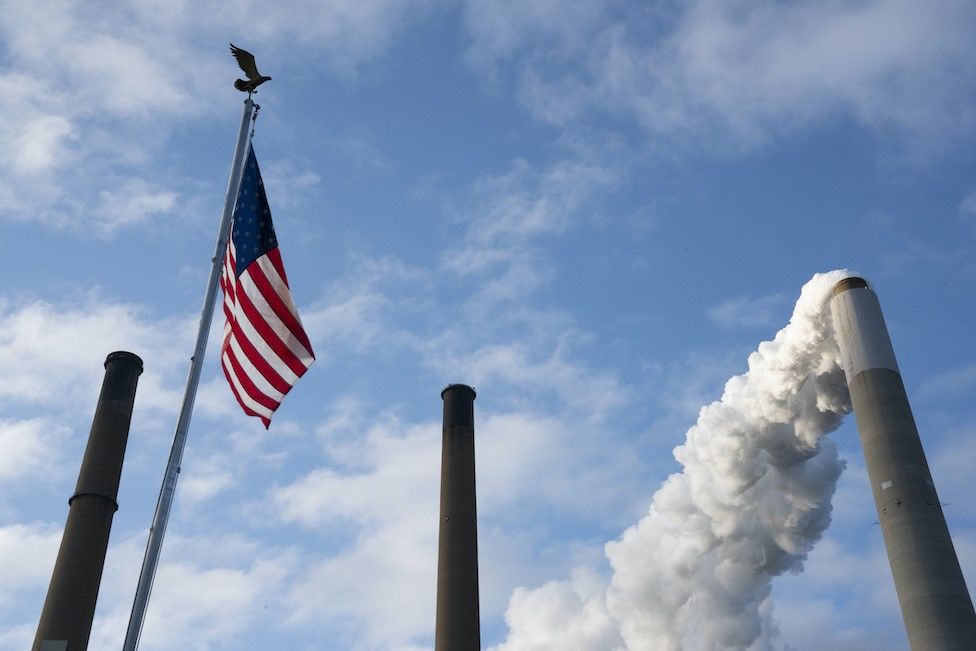Supreme Court hears case that may derail Biden's climate plan
 Image source, Getty Images
Image source, Getty ImagesThe Supreme Court has heard arguments in the most significant environmental case in a decade, which could undermine President Joe Biden's climate plan.
At issue is the authority of the Environmental Protection Agency (EPA) to limit emissions from power plants under the landmark Clean Air Act.
The 6-3 conservative majority court on Monday sounded sceptical of the EPA's authority to issue broad regulations.
But it is so far unclear how the justices will rule in this case.
The justices took up an appeal from 19 mostly Republican-led states, led by coal producer West Virginia and joined by some of the nation's largest coal companies, which challenges the EPA's power.
A ruling that limits the EPA's authority may undercut the Biden administration's plans to cut the country's greenhouse emissions in half by 2030.
It could also have broad consequences for regulatory efforts far beyond the environment - including consumer protections, workplace safety and public health.
The case has a curious twist - the court took on the appeal even though the federal regulation at the centre never actually took effect. There is no EPA plan currently in place to address carbon emissions from power plants.

Court could derail Biden climate plan
Analysis by Esme Stallard, BBC Climate team
Although it is not a current Biden policy that is being contested, the court decision could significantly impact the national climate policies that he can set and the country's progress against its climate targets.
This case is contesting whether the EPA - a national body - has the power to regulate planet-warming emissions for state-wide power sectors or just for individual power plants. This is important as not all states are in agreement with Biden's climate change agenda.
On his first day in office President Biden re-entered the US into the Paris Agreement - the first legally binding universal agreement on climate change targets - and committed the country to reducing its greenhouse gas emissions by 52% by 2030 against 2005 levels.
The nineteen states that are bringing action against the EPA made up 44% of the US' emissions in 2018, and since 2000 have only achieved a 7% reduction in their emissions on average.
Therefore without committed and accelerated actions from these states, or a mechanism for Biden to limit their emissions, the US won't be able to achieve his climate targets.
This potential failure is not just an issue domestically but also for global climate action - the country accounts for nearly 14% of the world's greenhouse gas emissions.

Representing the EPA before the court on Monday, US Solicitor General Elizabeth Prelogar argued the case should be thrown out for this very reason: because there is no regulation in effect and therefore no "harm" to the plaintiffs.
But the Supreme Court justices did not appear compelled by this argument.
"Just because there's no regulation, that doesn't mean there's no harm," Chief Justice John Roberts said in response.
Ms Prelogar said the administration was working on a new regulation, which the courts could later examine.
While much of the discussion on Monday was highly technical, some of the questions revealed justices' doubt that the EPA had the authority to set national policy.
Questions from conservative Justice Justice Samuel Alito in particular suggested that any broad assertion of power by the EPA would constitute a "major question", which court precedent requires Congress to have expressly authorised.
And Justice Alito also appeared to criticise the breadth of the EPA's authority, asking Ms Prelogar if the was "any reason the EPA couldn't force a system for single family homes similar to what it is claiming it can do with existing power plants".
Monday's hearing came hours after the release of a 3,675-page United Nations report by a panel of climate experts on the threat of global warming.
The report, approved by 195 national governments, found that many of the effects of global warming were simply "irreversible".



No comments